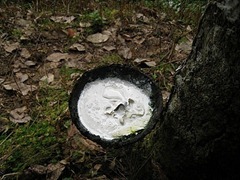India, China demand to keep up rubber in 2011: Thailand
 BANGKOK (Commodity Online) : World’s leading rubber producer and exporter Thailand said, fast growing economy India’s demand along with China could keep rubber prices up for next year as well.
BANGKOK (Commodity Online) : World’s leading rubber producer and exporter Thailand said, fast growing economy India’s demand along with China could keep rubber prices up for next year as well. According to Ananta Dalodom, Thailand’s former director-general of the Agriculture Department, rubber prices are expected to stay well above 100 baht per kilogramme.
Demand has shifted to China and India from the United States and Japan during the past three years, making China the largest importer at 2.7 million to 2.8 million tonnes, driven by high growth in the automotive sector.
Demand from India keeps rising due to its economic growth, as India plans to construct roads covering up to 200,000 kilometres using natural rubber as part of the material.
Raw rubber sheet prices are now quoted at 138 baht per kg, while smoked ribbed rubber sheets No 3 (RSS3) were trading Monday in the Hat Yai cash market at 149.55 baht, with latex at 131 baht per kg.
Rubber prices have been rising steadily since 2002 when the raw rubber sheet price was 29.15 baht per kg, RSS3 was 30.23 baht and latex 30.49 baht.
“The prices are very high and have shown no signs of declining. Prices should remain at least 100 baht per kg from now on,” said Dr Ananta.
Thailand, the world’s largest exporter, produces around 3 million tonnes per year, accounting for 40% of world production, followed by Indonesia and Malaysia.
Dusit Rojanawanitchakorn, the owner of a 500-rai rubber plantation in Chon Buri province, said he now earned 1.5 million baht per month compared with an average of 800,000 baht per month last year, when prices of the raw rubber sheet during the same period were 90 baht per kg.
“These are the highest prices I’ve ever seen, and I think it will stay this way for at least two years,” said Mr Dusit, adding that current prices were reasonable.
Kanda Chamchumrus, who owns a rubber processing plant, disagrees, saying the price surge is due mainly to speculation by large factories selling their products at high prices, which distorts prices and does not represent the real market.
“I have heard from rubber planters that they do not want excessive prices because they are afraid the system will fall through, as this will prompt users to shift to substitute products,” said Mrs Kanda.
Prayong Hirunyawanich, chairman of the Federation of Thai Industries’ natural rubber and rubberwood cluster club, said rising rubber prices had increased costs for businesses.
“Manufacturers cannot raise their product prices to pass on the higher costs, as the Commerce Ministry has called for price freezes to try to curb inflation,” he said.
(Source: http://www.commodityonline.com/news/India-China-demand-to-keep-up-rubber-in-2011-Thailand-35050-3-1.html)
You can return to the main Market News page, or press the Back button on your browser.

